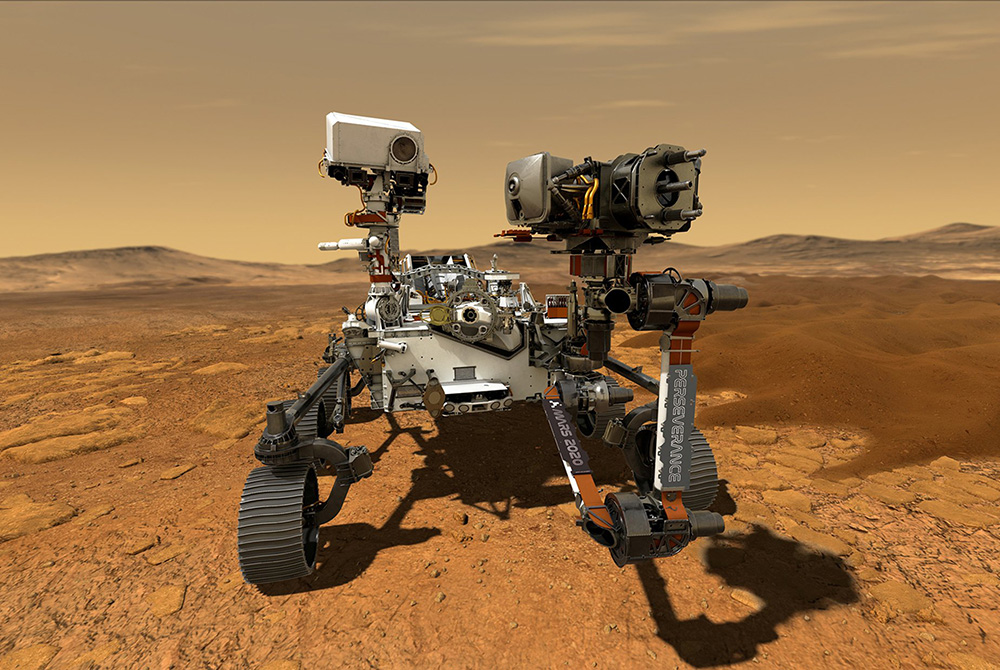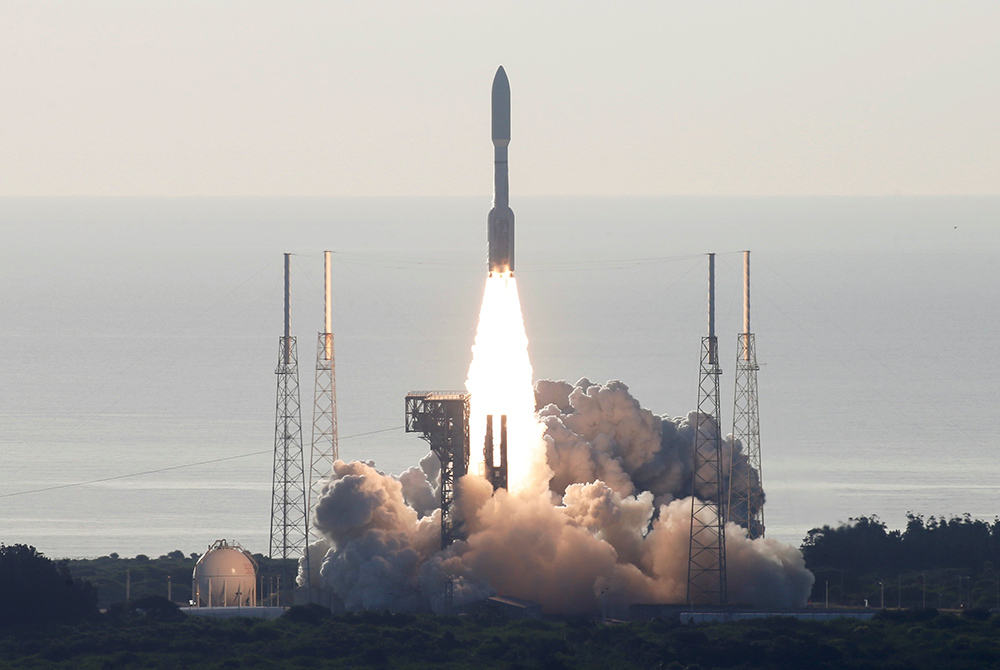
An illustration shows NASA's Perseverance Mars rover, which landed on the planet Feb. 18. (CNS illustration/JPL-Caltech, NASA handout via Reuters)
For some people, it might be a 126-million-mile leap of faith.
A rover, appropriately named Perseverance, has been driving itself around Mars for several months now. Among other tasks, this rover searches for life's leftovers embedded in the now rocky areas of the red planet's previous flood plains. Might its findings challenge religious beliefs about a saving God long held dear to so many of us? Might these findings, whatever they may be, help to narrow the centuries-old gulf between faith and science? Or, might the chasm grow significantly wider?
The science fiction of my childhood has become the factual lodestar of my adulthood. My first introduction to science fiction was the serialized episodes of "Flash Gordon" every weekday afternoon on TV. I hurried home from my grammar school to watch Flash and his friends save humanity from the evils of Ming the Merciless, first on fictional Mongo and then on the factual Mars. Queen Azura with her black and white magical sapphires, her ability to turn people into clay and banish them to caves where they could sink in and out of the walls, the forest people who guarded one of the sapphires, the scientist, Dr. Zarkov, the noble Prince Barin, and, of course, Flash Gordon's flash, Dale Arden, ever at his side, added a lot of intrigue and a little romance to the salvific space exploits of the series.
It wasn't long before I discovered science fiction books at the Walker Branch library on the southwest side of Chicago. They too transported me to faraway worlds on rocket ships blasting off from earth to explore the heavens and to conquer evil. Would that the problem of evil, stumping theologians and philosophers through the ages, be solved as easily.
For me, these then imaginative adventures raised intriguing questions about God that the religion classes of my grammar school years failed to address in any sort of believable way.
Back then some adults thought science fiction nothing more than pulp fiction, an unworthy literary genre. They thought reading science fiction would, at least, be wasted effort. At most, it would rot one's youthful brain into mush. Luckily for me, neither my parents nor my teachers nor my local librarians felt that way. I credit my lifelong interest in reading books to these adults who encouraged me to read, among other books, science fiction.
In retrospect, science fiction was spiritual reading for me, even though I did not fully realize it at the time.
Question 16 in The New St. Joseph Baltimore Catechism (No. 2) Official Revised Edition asked, "What do we mean when we say that God is all-present?" Answer: "When we say that God is all-present, we mean that God is everywhere." I guess "everywhere" was to include interplanetary divine presence, but that possibility was never covered in the catechism, nor discussed in religion class.
My youthful diet of science fiction eventually posed other questions. Is there intelligent life on other planets? If so, do they have souls? Did Christ's dying and rising save them too? Might they have a religion? Do they have sacred texts that tell fanciful stories about their origins?

A United Launch Alliance Atlas V rocket carrying NASA's Mars "Perseverance" rover vehicle takes off from Cape Canaveral Space Force Station in Cape Canaveral, Florida, in this July 30, 2020, file photo. (CNS/Joe Skipper, Reuters)
These soul seeing questions, reincarnated by the ongoing exploration of Mars, are now focal points of my ongoing meditations on the divine presence and its manifestations in past, present and future life.
Today, we realize the holiness of the Earth's creations, and the evil of destroying the natural world. What about the worlds beyond our own? We have begun to seek answers to these mysteries and, no doubt, will continue to do so. Humans landed on the moon more than a biblical generation ago. A space station circling the Earth, populated by humans, peers even farther into outer space. Probes hurdle toward planets beyond Mars.
So how far off is the time when theological reflection might embrace new scientific realities as spiritual bridges to tomorrow? How might discovery of extraplanetary life, past or present, enhance our theologies of the divine? And might creation-centered spirituality, today pregnant with meaning, tomorrow birth a more complete realization and understanding of the divine presence throughout myriad solar systems?
I wonder if findings about life elsewhere call for alterations to the seamless garment? How might other forms of life in far off places reconfigure the ever-ongoing pro-choice/pro-life discussions tailored to ever expanding universes?
Advertisement
I do not read much science fiction these days, but I did recently reread Walter M. Miller Jr.'s book, A Canticle for Leibowitz. It ends with a representative group of people blasting off to another planet to save humanity from Earth's destruction. And let us not forget films exploring the possibilities and problems of intergalactic realities, e.g., "E.T. the Extra-Terrestrial" and the "Star Wars" series, each beginning with the captivating phrase, "A long time ago in a galaxy far, far away …"
Religions value traditions, but too often tradition was focused on the past. "Tradition is what the last pastor did," a common mantra of local parish life, encapsulates this limited perspective. The Second Vatican Council expanded the tradition of tradition to include the present as a constitutive element. Now, in the post-Vatican II era, thanks in part to Perseverance and other probes traveling to other planets, the future increasingly becomes part of tradition. Might someday soon the mantra mentioned above evolve to, "Tradition is what the next pastor will do"?
My soul sees revelation manifesting itself in many different forms and circumstances. My bet is that this rover, Perseverance, roaming over the landscape of Mars will find other displays of the divine.
I pray that we all might have the perseverance to pay close attention to the yet unknown traditions of the future as further embodiments of divine revelation.
May the divine force be with you and me.








